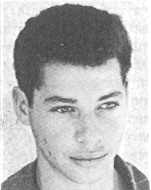Milo, Joseph (“Yossi”)
An only son of his parents, Moshe Vitka, members of Kibbutz Merchavia. He was born on March 28, 1947, in Kibbutz Merhavia, where his parents gave their strength and energy to work for the country: the mother of the ATS military unit during the Second World War and the father as a member of the Haganah and a cantor. In classes in the kibbutz educational institution, and as a good student devoted himself to agriculture, he worked and researched an experimental plot for growing grain. He was pleasant to learn and excel in, and his parents educated him in spirit and set him to mitzvot and consciences. Elem was cute and his smallness showed a mixture of warm emotion and lucid logic, desire for knowledge and a sense of duty and gentleness in relationships and resourcefulness in an act of life. His honest mind guided him with all sense of justice was inherent in him and because of the responsibility he imposed on himself acquired him friends and bad. His wish was that after completing his army service, he would resume his studies and continue farming. From an early age he was marked by a noble inner peace. Was complete with himself and with his world around him. There was no limit to his approval when he started driving a tractor and then went to plow and then proved his responsibility and his serious attitude to work. Was a member of the Gadna and Ha-Po’el youth movements, and after completing his studies he was drafted into the IDF in November 1965, and even though he was the only son of his parents, he convinced them that he was in a combat unit and volunteered for the Armored Corps. He is “anxious” that his friends will do more for the homeland and for the values for which he grew up and was educated on the kibbutz. He later taught tank commanders. Was devoted to his role as trustee to his commanders as he had in his civilian life. While in compulsory service, the Six-Day War broke out and on the first day of the battles, on 26 June 1967, he fell in the positions of Rafah as a tank commander. He was laid to rest at the military emergency cemetery in Bari and later moved to rest in Kibbutz Merhavia. A pamphlet issued by the Jezreel Regional Council raised his memory. A booklet bearing his name was issued by the kibbutz. In the booklet 53 of them, published by the Kibbutz Artzi in memory of the fallen members of the battle, a page was dedicated to his memory.
